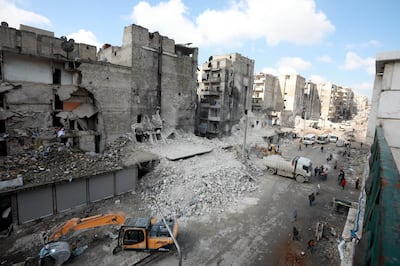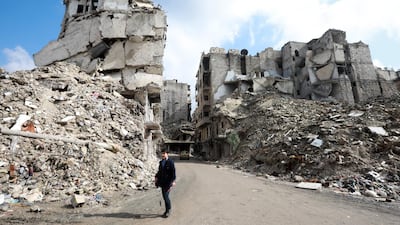Before the war, Bakr Sabbaghe was a tailor in the same area of Aleppo where he was born. Even when bombs rained down on the rebel-held half of the city in which he lived, Mr Sabbaghe said he did not want to flee.
With his wife and young children, Mr Sabbaghe, 38, struggled amid the rubble to survive. "We used to be bombarded every day, but I didn't leave because I don't want to leave my city," he tells The National.
But then, in late 2016, four years after most of the city fell to rebels, forces loyal to the government of Bashar Al Assad recaptured Syria’s former industrial powerhouse.
The toll of the fighting was extreme. Aleppo was once described as “Syria’s Stalingrad”.
Mr Sabbaghe said that when the guns fell silent, life appeared to regain a sense of normality, despite the shattered environment left to those who remained.
“We were no longer afraid of bombs or air strikes. Our children could go out to school or play,” he says. “Services started to gradually get better – in terms of electricity, we didn’t have any before the government came to east Aleppo but it started to get better at the beginning of 2017. Water, fuel and food started to be available at reasonable prices.”

But the situation did not last long, he says. “Electricity has become rare in recent months. It comes one or two hours per day ... we don’t have running generators because not many people live here yet, so we ended up using candles,” Mr Sabbaghe says.
But sitting in the dark is the least of their worries, he says. Now the biggest concern is the government militias.
“I don’t let my children go to school alone and have forbidden them from leaving the house,” he says. “Even though the war has ended – at least here in our city – no life has yet made its way back to the city streets.”
Abductions have become common and there has been a spate of killings. Adults and children have been raped.
Esra’a Obada, who lived throughout the war in a front-line neighbourhood between the rebels and regime forces, worries about her three daughters being kidnapped.
“Many girls have disappeared in the city in the last few months, taken in cars or followed home and taken in front of the house,” she says.
“We’ve got a lot of foreign militants running the city’s checkpoints,” she says.
Many are Lebanese or Iranian. “The police aren’t in charge here, they are frightened of them.”
The situation is especially bad in areas around Aleppo University, she says, where cars flying the yellow of Hezbollah or green flags with Shiite slogans cruise the streets.
“They are controlling the city with fear,” Ms Obada says.
She says people report the crimes to the police but little is done. “We’re known among other Syrian provinces as the ‘Chicago of Syria’,” she says.
“When the city was liberated, we felt so enthusiastic and positive,” she says. “We had high hopes that the city would get back on its feet and we would rebuild what the war destroyed.”
But those hopes are becoming more and more forlorn. Mr Sabbaghe has now been ordered to leave his home.
Hundreds of families in the shattered city have been left with nowhere to live after Aleppo city council said buildings could collapse. Although few areas escaped unscathed from the fighting, many residents have no alternative.
“I didn’t leave my house because I can’t afford to live anywhere,” Mr Sabbaghe says of the eviction notice. “It’s ironic that we survived all this and will be displaced by a council order.”
He said he does not know where he will end up because he is struggling to make enough to feed his children let alone rent accommodation elsewhere.
“Food is available but where can I get enough money to buy food?” he said. “I earn barely 15,000 Syrian pounds (Dh110) a month; we’re relying on lentils and rice and cooking using wood – cooking gas is unaffordable and not for the poor people here,” he said.
Mr Sabbaghe said that although they were promised compensation for their house, none of the families affected by the eviction know how much it will be or when it will be paid. “It’s not fair on us to undergo another displacement after the fighting has gone.”
He believes the order is less about unsafe buildings and more about moving people out of communities that supported opposition to the government. The Assad regime has been accused of using redevelopment to reshape Syrian cities’ ethnic and political make-up.
In nearby Homs, builders set to work in pro-regime neighbourhoods shortly after the Syrian government retook the city. Homs’s Sunni districts remain shattered and deserted.
In Aleppo, a controversial redevelopment plan has also drawn criticism for tearing down parts of the historic city and putting up skyscrapers and malls.
“Our neighbourhood of Al Zahra’a in western Aleppo was the last front line with the rebels,” Ms Obada said. “They didn’t stop bombarding us after 2012. It’s not as intense as it used to be, but we are still suffering from the impact of the war.”

